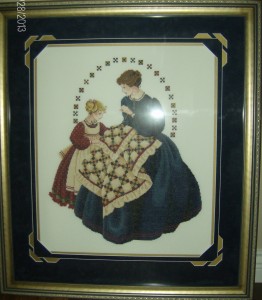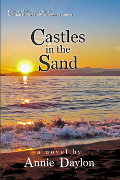by @AnnieDaylon

On Feb 21, 2010, while standing on the Vancouver Waterfront, I snapped this photo of the Olympic Cauldron. At the time, I was immersed in gratitude. Just the fact that David, my husband, and I had made it to witness the Vancouver Olympics, was miraculous.
Today, inspired by the 2014 Winter Olympians, I pulled the following memoir from my files. I am posting it in the hope that it might help someone who is undergoing a difficult journey, medical or otherwise.
OLYMPIC HOPE
Three hours. A crowded hospital room. My husband, David, looked relaxed in his cushioned recliner. I squirmed in my resin chair and glanced at the door. Yes, I could leave at any time; David couldn’t. I reached for the sides of my chair and clamped my fingers tight.
Today the usually chatty group was hushed, all staring at a television set, waiting for the big announcement, hoping that it would be favourable for our home city of Vancouver. Breathing stopped as Dr. Jacques Rogge broke the seal on a huge, white envelope, pulled out the winning bid and began to read: “The International Olympic Committee has the honour of announcing that the twenty-first Olympic Winter Games in 2010 are awarded to the city of………Vancouver.”
Applause erupted. David looked at me, his brown eyes tinged with wonder. He said nothing, just tipped his head to one side and smiled, but that was enough to make my throat tighten and my eyes blur. I broke eye contact, choosing instead to look at the tube running from the injection site in his arm to the bag of chemotherapy drugs hanging above his head. It was July, 2003. We couldn’t begin to think about 2010.
David and I had been married for twenty-eight years when he was diagnosed in November, 2002. It was a Friday and, as we sat on our veranda for the usual end-of-day chat, he said, “I have cancer.”
Instantly, some core piece of me fled and hovered in mid-air, a few feet away. I felt safe there—on the outside looking in, watching this event like it was a scene in a television drama. This couldn’t be real. This only happened to soap-opera people, or maybe to real-life, far-away people.
I opened my mouth, a futile attempt to speak.
“But the doctor thinks it might be the good kind of cancer. Hodgkin’s disease…they can treat that,” he added.
I slumped into my Adirondack chair. I heard or sensed a slow, grinding noise, like that of a run-down carousel coming to a halt. Then… nothing. No chattering Stellar’s Jays. No rumbling car engines. No laughing passersby. The planet had stopped spinning. When I finally blinked, it hit me that the earth had merely hiccupped, spat us out and was now returning to orbit. I wanted to chase it; we couldn’t stay here, abandoned, alone. All the while, I was trying to fathom what David had said—the ‘good kind of cancer?’ He reached out his hand and I clasped it. Then, we just sat.
There was no adjustment time; there was only the journey, no choice but the journey which began the next morning—a one-way trek through X-rays and blood tests and cat scans and needle biopsies. All of which proved inconclusive.
“You need a lung biopsy,” said the oncologist, a dark-eyed, straight shooter who did not smile. “I think you have Hodgkin’s disease; we can treat that. But you could have lung cancer. If it’s lung cancer, then …” She shrugged. “Do you smoke?”
“Yes.”
“Humph.” She threw her hands up and turned to face her computer. “We’ll get the test done as soon as a surgeon is available.”
For two months, we were in limbo, waiting for a surgeon. Stress hovered like an offshore tempest. David showed no signs of needing any coping mechanism—other than sleep. But me? Meditation. Hot baths. Exercise. More meditation. Anything to ward off the ‘what if’ pictures—all worst-case scenarios—which pierced my thoughts and left me trembling. This reaction was nothing new for me, a well-practiced ‘what if’ thinker.
“What if the mortgage rate increases when we’re ready to renew?” I would ask David, not once, but repeatedly.
He always had the same response. “No point in worrying about it. If it doesn’t go up, you worried for nothing. If it does go up, you’re stressing about it twice.” He’d then yawn and continue watching hockey. Exasperated, I’d throw my hands in the air and walk away.
But now, especially now, in the face of cancer, I was sure that he would ‘see the light’. His laissez-faire attitude would change.
I was wrong.
“It is what it is, Ange,” he said. “I can’t worry the cancer away; there’s nothing I can do but wait.” And that’s what he did: waited…and slept.
After a while, I realized that my usual frustration at his laid-back approach to life had vanished; in its place was total respect.
All this time, while we were coming to terms with the diagnosis, while we were waiting for a surgeon, David’s health was deteriorating. He became gaunt. Ate next to nothing. Slept up to twenty hours a day. He seemed to be disappearing bit by bit, like bubbles dissipating in a bath. And I could do nothing but watch. Christmas and New Year, meaningless events now, approached, intruded, and receded. Finally, in mid-January, a surgeon became available and a lung biopsy took place. We settled in again after that, thinking we would be waiting some more. But, just two days after the procedure, the surgeon called David’s oncologist who immediately phoned us.
“You have Stage III B Hodgkin’s lymphoma,” she said. “You will have a set of final tests on Monday. If all goes well, treatment starts on Tuesday.”
Lymphoma. Not lung cancer. Lymphoma. ‘The good kind of cancer. They can treat that.’ We smiled and we cried.
On Monday, hopes high, we went to the hospital and paraded through blood work, a bone-marrow biopsy, another meeting with the oncologist and a meeting with therapy consultants. The two consultants presented us with tons of information, oral and written. They read through twenty pages of data about drugs and side effects; the side effects alone slammed into us with the force a tornado. “Do you have any questions?” they asked.
We shook our heads. How could we have questions? There was just vocabulary, a tsunami of medical terms and possible treatments and chemotherapy drugs and anti-nausea drugs and catheter options and side effects and more side effects. We left, thankful to escape the onslaught, and took with us the binder of materials, promising to read everything and to ask questions as they arose.
Chemotherapy started the next day and, soon after that, David’s health showed improvement; his appetite came back and he began to gain weight. Surprisingly, the side effects, which we feared the most, were minimal.
Every two weeks, for eight months, we trudged back to the hospital for more chemotherapy. After the final treatment and the follow-up radiation, there was remission. Life returned to normal. Or as normal as it could be. I still felt my body shudder with anxiety occasionally. At some point, in the middle of each night, I would reach across the bed to touch David’s back. When his skin felt warm and dry, and not drenched with the sweat that was symptomatic of lymphoma, I would roll over and go to sleep, reassured that there were no monsters in the room.
Every few months, there were blood tests and CT Scans. And we waited. At first, when waiting became intolerable, we called for results.
“No news is good news,” they said. “We’ll call you if there is a problem.” After that, I worried that the phone would ring.
And, in February of 2005, it did. No information was given, other than the fact that the oncologist wanted to see David. We made the appointment. And, again, we waited.
Two weeks later, in the oncologist’s office, the news came. “Your cancer is aggressive—chemotherapy and radiation won’t work,” the doctor said without blinking. “What is needed now is a peripheral blood stem cell transplant; you’ll have some tests and we’ll contact you.”
Just like that, we were back in the battle fray. This time there was no shock. There was just doing and dealing. We learned that there was a 10% chance that the treatment would kill him and a 50% chance that it would work. “Those are pretty good odds, Ange,” said David. I stifled a scream.
After four more months of chemotherapy and tests, David was admitted to hospital, in isolation, for a full month. Each day, while he was there, I got up before dawn to clean a section of our house—the home environment had to be germ-free when he returned. I washed the walls and put bleach down all the drains to prevent bacteria from seeping in. I moved the fridge and stove and scrubbed behind them. I stripped caulking around two bathtubs and three sinks and re-caulked them. Then, each day, I drove the one-hour trip to the hospital to visit.
After an extensive bout of chemotherapy, a stem-cell transplant and recuperation time, David, hairless and fragile, came home. His immune system was brand-new; we had to be excessively vigilant for the first one hundred days. He couldn’t be near plants or animals so I threw out my prized African Violets and made sure our much-loved dog, Angus, stayed away. David couldn’t be around people either. There were no trips to the mall or the movie theatre or the grocery store—too many germs. Friends and family were supportive and understood, but some genuinely-concerned people just wanted to visit. I soon came to realize it that, unlike our dog who had an innate sense that he shouldn’t get too close, some people didn’t get it. I assumed the role of body guard.
“You’re my little Pit Bull,” David teased one day when I was standing at the window, arms folded, scrutinizing people who had dared to venture up our walk.
“You got that right,” I replied, as I headed to the door to dispose of well-meaning visitors.
We marked each passing day by placing a giant, red X on the calendar. After the obligatory hundred days, when David’s immune system had strengthened slightly, he began to receive inoculations—his immune system was that of a newborn and he needed to have all the same shots that babies have.
Every three months, there were more tests and we waited. “It will be five years,” the haematologist said during one visit, “before we can use the word ‘cure’.” Five years. It was 2005. We still couldn’t think about 2010.
As all this went on, we became more and more aware of the fact that the bond between us was strengthening. Our priorities, which had often appeared as divergent paths, now coincided. A single road. We didn’t need the huge, Victorian house so we sold it, choosing to live in a smaller one—mortgage-free. We spent less and saved more; we even bought a car with the money we accumulated from quitting smoking. During the first hundred days, we developed the stay-at-home habit and we continued that, choosing each other over the outside world. We had time together and that’s all we wanted: time.
Slowly, time passed… a day, a week, a month, a year, two years, four years…
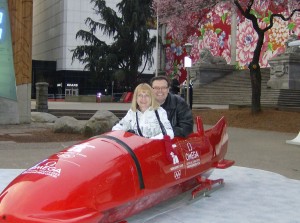 On Feb 21, 2010, while standing on the Vancouver Waterfront, I snapped a photo of the glowing Olympic Cauldron.
On Feb 21, 2010, while standing on the Vancouver Waterfront, I snapped a photo of the glowing Olympic Cauldron.
Later, I asked one of the blue-jacketed volunteers to take a picture for me. Tears surged as I recalled the freeze-frame moment in the chemotherapy room seven years ago when 2010 seemed so far off. But now, the Olympics were here. And here we were, in an Olympic bobsled. After an amazing and terrifying ride.
“Smile,” said the volunteer.
We obliged.
(Four years later? David is still here, still smiling, a miracle of modern science and olympic hope. )
My best to you,

 Many thanks to Robert for an excellent workshop. To learn more about Robert and his writing visit: www.Robertdugoni.com.
Many thanks to Robert for an excellent workshop. To learn more about Robert and his writing visit: www.Robertdugoni.com.


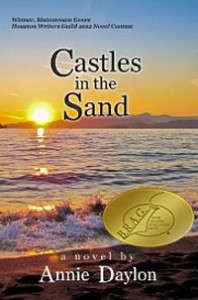





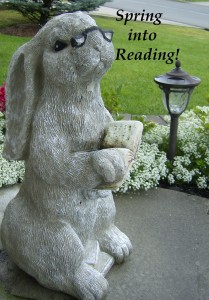


 On Feb 21, 2010, while standing on the Vancouver Waterfront, I snapped a photo of the glowing Olympic Cauldron.
On Feb 21, 2010, while standing on the Vancouver Waterfront, I snapped a photo of the glowing Olympic Cauldron.

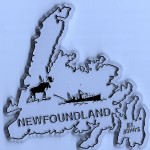







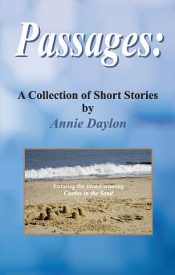

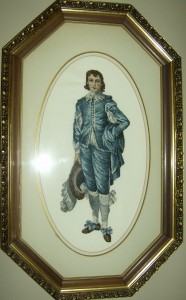 2) I love the
2) I love the detail of Pinkie and Blue Boy; I have done some needlework and have great respect for the patience and talent required produce this pair. It’s difficult to see in the photos, but the work is petit pointe. I may have walked by them though, had it not been for the oval matte and the octagonal frames.
detail of Pinkie and Blue Boy; I have done some needlework and have great respect for the patience and talent required produce this pair. It’s difficult to see in the photos, but the work is petit pointe. I may have walked by them though, had it not been for the oval matte and the octagonal frames.
